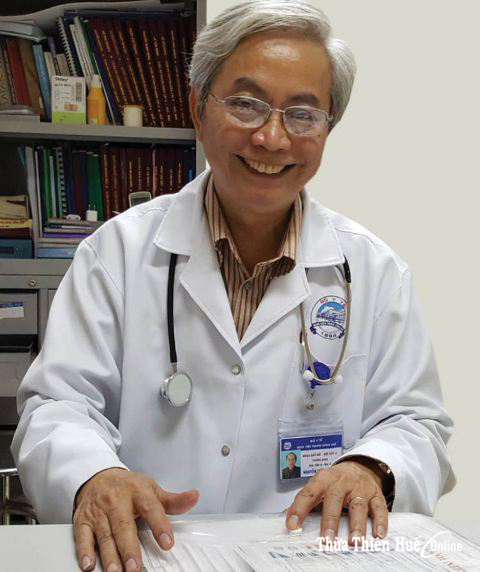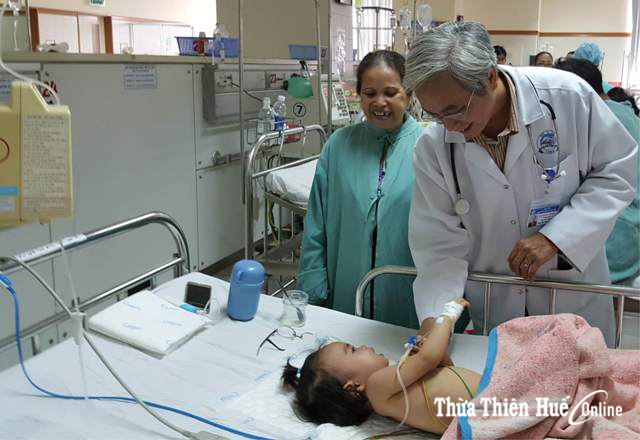
Assoc. Prof. Dr. Nguyen Viet Quang
The Silent work
At the end of the winter, Hue rains continuously and is really cold. In the narrow working room, he stood up then sit down because of the phone calls and colleagues coming in and out asking for his orders. "I am so busy, this clinic is so crowded with seriously-ill patients that we are swamped with works all day," he smiled. The door outside the room opened again ... "Excuse me, Dr. Quang ..." There is no other way, he said gently: "Give me a few minutes, please".
During the conversation that day, he talked about the years studying at Hue Medical University (now Hue University of Medicine and Pharmacy) in the subsidy period. At that time, admission into Medical University was a dream of many students. He studied Anesthesiology, a difficult and challenging field that, as pointed out by professors, requires the doctor to be “the first to come, but the last to leave” and helps the surgeons become the prestigious ones with the title of the "golden hands". Nevertheless, when he studied further and understood all the humane core values of an anesthetic doctor, he had no thought of transferring to another field or department.
After graduation, then working at the Anesthesiology Department, Hue Central Hospital, soon he was appointed Deputy Head and then Head of Anesthesiology Department A and the Center for Treatment on Request and International Treatment, Hue Central Hospital. With new responsibilities, he not only performs well the expertise of a good doctor but often goes to field practice, plans to consult with his leaders to develop his department.
Asked about the catchphrase that his colleagues always mention: “the anesthetic doctor is a quiet doctor”, he laughed: "In every big or small surgery, the anesthetist must come at least 40 minutes in advance to assess the patient's condition, prepare the operating room and the anesthesia steps. When the patient can get a “good sleep”, it is then the surgeon’s turn. After the surgery, the doctor has to take care of the patient until he wakes up. This is considered "Phase 2"of the treatment process, is also the stage when patient is in his weakest state, only a minor malpractice can be life-threatening. "
Extreme caution should be taken for each small change in the heart rate, blood pressure of patients. Thus, Assoc. Prof. Dr. Nguyen Viet Quang and his colleagues always predict the amount of anesthetic drugs for patients not only by the formula but also by the sensitivity and experience to make sure that the surgery is safe.
Assoc. Prof. Dr. Quang said that the success of a surgery is highly dependent on the anesthetic doctor. However, very few know behind the operation what important things the anesthetic doctor does for the patient to recover. In Medicine, all comparison is inappropriate, but putting on the white blouse means conforming to medical ethics. As of now, there are countless patients brought back from the death’s land by him. That is what he must consider seriously, go under pressure, and take responsibility for his decision.
Recently, there was a case of a young man with blunt abdominal trauma, intra-abdominal hemorrhage due to traffic accident in Phu Loc. When receiving information from the Emergency Department, the team immediately co-ordinates with the Emergency department’s surgeons. If there had been no anesthetic methods, blood transfusion in time, the patient would have died from shock and blood loss, there would be no time to sew the liver and the spleen. After the surgery, he and his colleagues put the patient under his monitor for more than ten hours. The patient has escaped from the "scythe" of death.

Assoc. Prof. Dr. Nguyen Viet Quang is visiting patients
Crowning achievements
He possesses an active style, does his best at work. Despite almost being in his old age, he is always progressive, interested in scientific research. In his office, he has a huge bookcase and a note "one page each day". At the end of working hours, after visiting the patients, he continues working in front of computers to access specialized information to collect and apply knowledge into practice. From 1998 to 1999, he graduated his Residency in the field of Anesthesiology in France and was awarded the Doctorate in 2008, the Associate Professor in 2014.
At this point, he and his colleagues have conducted more than 150 research projects in medicine at university level and 2 at provincial level and 2 at national level. Scientific projects that he successfully defended have gone beyond the scope of the department or the province, such as: “Research on selection and resuscitation for organ donors with brain death” which is put in the center of national research; “Research on cardio-pulmonary transplant for patient having LVAD (left ventricle assist device)”. He is currently working on a project at the national level: “Research on using autologous stem cells in treatment for brain injury”.
In 2013, a provincial-level research project led by him made a great reputation: “Research on intra cranial pressure in resuscitation and solution to decreasing mortality of brain injury patients at Hue Central Hospital”. In 2016, Assoc. Prof. Dr. Quang has been successfully managing the provincial research project: " Research on variation of central venous oxygen saturation (ScVo2) of brain injury patient in the first seven days." His research has helped Hue Central Hospital save nearly 100% of patients with severe brain injury. He has intensively resuscitated and saved a patient’s heart after five days of brain death to contribute to the successful heart transplant surgery at Hue Central Hospital, an amazing event not only in Vietnam but around the world in 2011.
Assoc. Prof. Dr. Nguyen Viet Quang is currently a distinguished doctor; part-time lecturer in Hue University of Medicine and Pharmacy; Head of the Anesthesiology Training Division, Hue Central Hospital. During his time of dedication, Assoc. Prof. Dr. Nguyen Viet Quang was awarded the Certificate of Merit by the Prime Minister for his contributions to the national development; the title of Creative Intelligence by Union of Associations of UNESCO Vietnam and many other noble titles of the province, ministries, and the country.
By MINH VAN